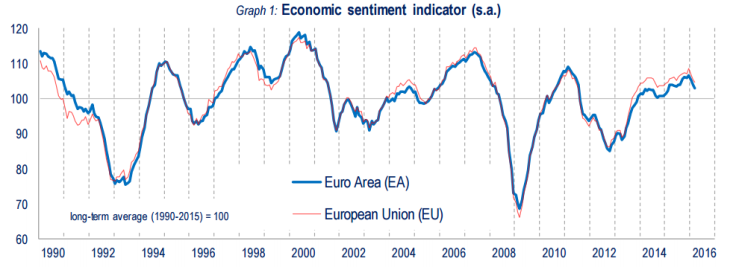European Economic Sentiment Falls To Lowest Level Since February 2015

Despite attempts by the European Central Bank to bolster economic growth, confidence in Europe's economy is faltering. In the latest measure of economic sentiment released by the European Commission Wednesday, expectations fell for a third consecutive month in March, registering 103 in the eurozone after reading 103.9 last month.
The number, which came in below analysts' expectations of 103.8, is the lowest reading since February 2015. Within sectors, the sharpest falls were seen in measures of consumer confidence, construction and financial services.

The broader European Union — which includes nations like the U.K. that do not use the euro — saw its economic confidence indicator decline to 104.6 from 105.3.
Despite years of cash infusions and extraordinarily accommodative monetary policy from the European Central Bank (ECB), growth in the eurozone continues to underwhelm. Earlier in March, the ECB announced a new spate of measures intended to push up inflation and spark economic vitality, including a bolstered asset purchase plan and a reduction of benchmark interest rates further into negative territory.
“Conditions have significantly changed since early December,” ECB Chief Mario Draghi said at the time, citing sharply reduced inflation expectations and financial market vulnerabilities that spread globally in the first two months of 2016.
As Bloomberg noted, the reading contradicts other measures, including the German Ifo Business Climate Survey, which turned positive in March.
© Copyright IBTimes 2024. All rights reserved.






















